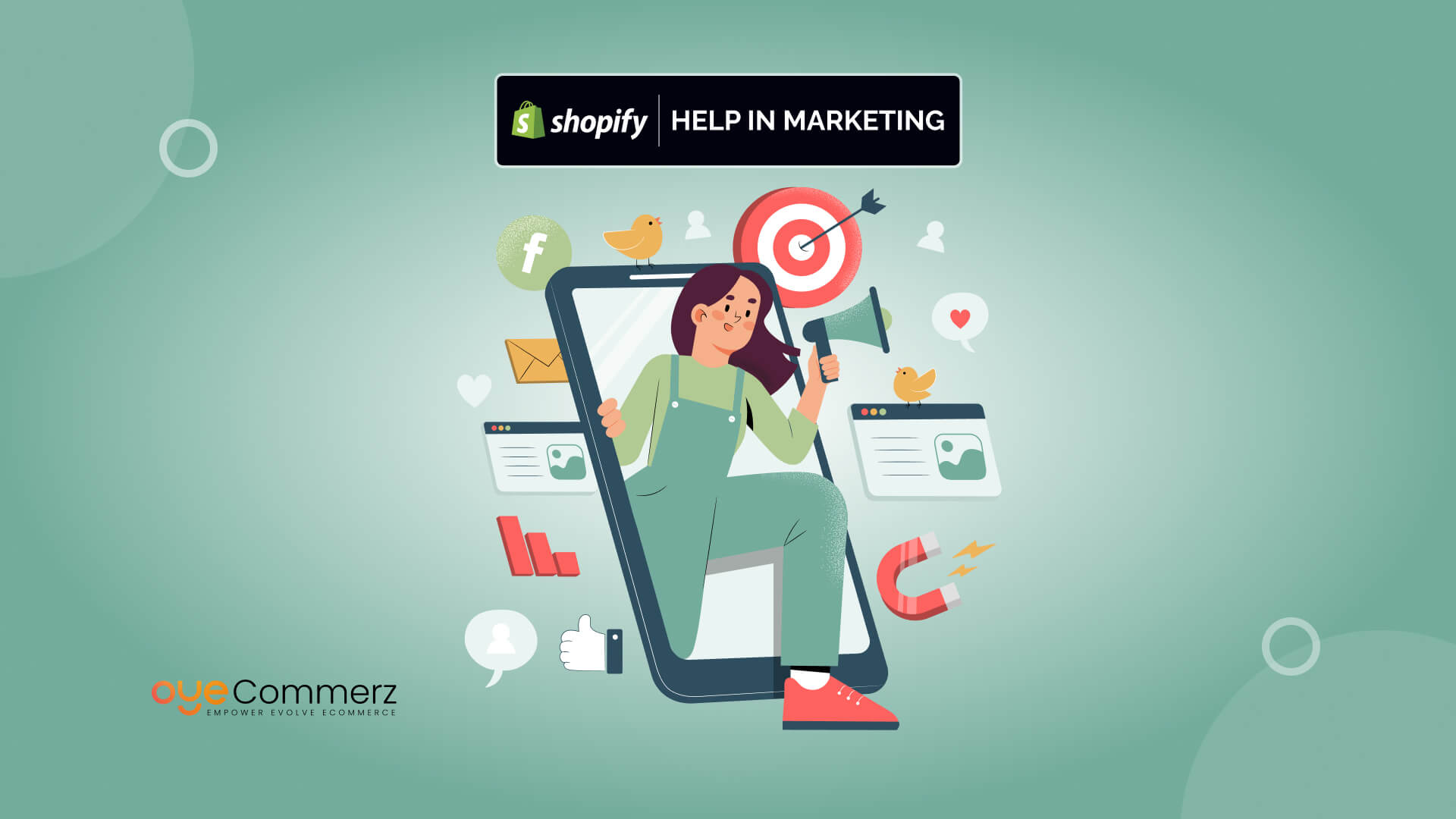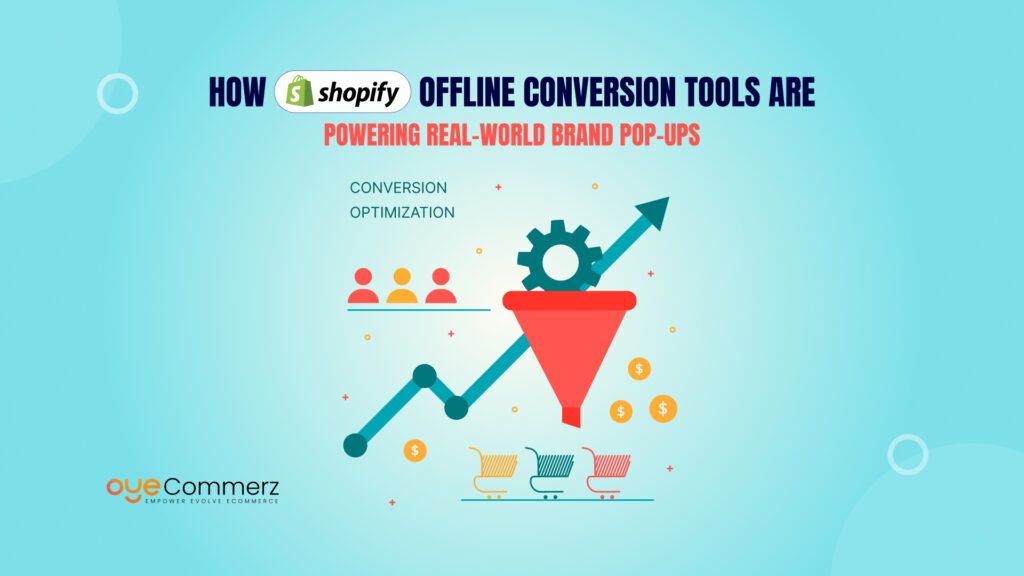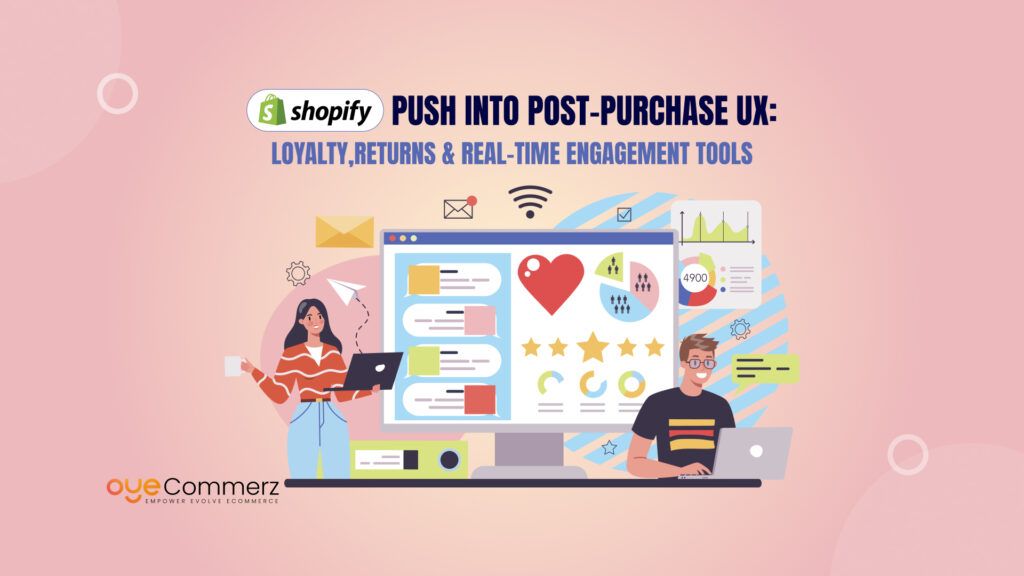Marketing is the backbone of online selling. No matter how great your product is, without effective marketing, reaching the right audience becomes a challenge. This is where platforms like Shopify step in not just as eCommerce builders, but as complete business solutions.
Over the years, Shopify has evolved far beyond a basic store setup tool. Today, it offers a wide range of marketing tools and integrations that help businesses not only launch their stores but also grow them effectively. From SEO and email campaigns to social media and automation, Shopify marketing services are designed to make promotion easier and smarter.
If you’ve ever wondered, Does Shopify Help with Marketing?, the answer is a clear yes. Whether you’re just starting or looking to scale, the platform supports your goals with built-in features and access to trusted Shopify marketing experts.
In this blog, we’ll explore how Shopify empowers your marketing strategy. You’ll discover the tools it offers, how they work, and why choosing the right services can transform the way your store connects with customers and drives sales.
Table of Contents
ToggleHow Shopify Marketing Helps in Businesses
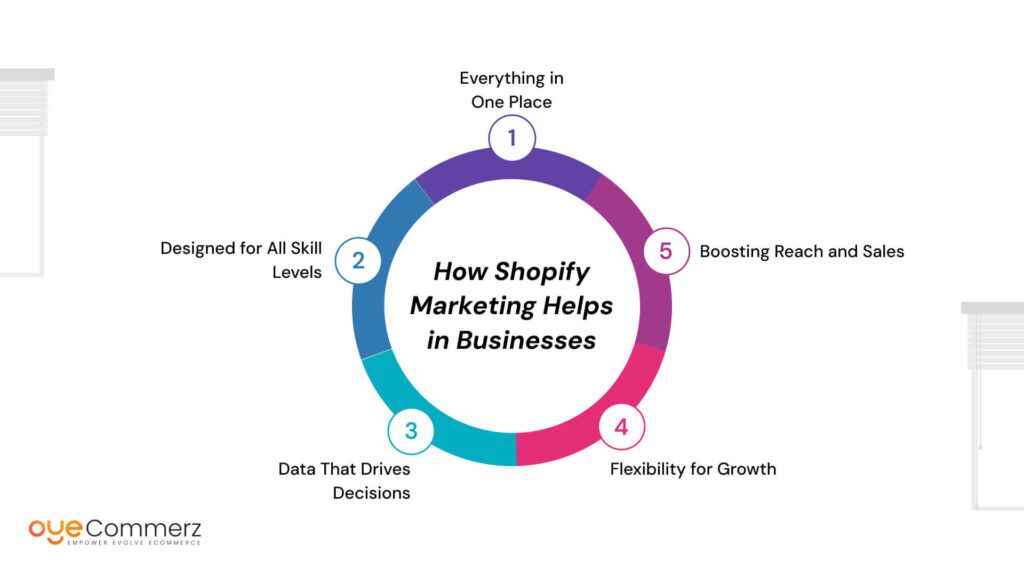
Marketing is essential for turning a great product into a successful business. But with so many tools, channels, and strategies out there, it can quickly become overwhelming—especially for small business owners. That’s where Shopify steps in.
More than just an eCommerce platform, Shopify marketing services are designed to help businesses at every stage, from launch to scale-up. Whether you’re a solo entrepreneur or running a growing team, Shopify provides marketing solutions that are powerful yet easy to use.
1. Everything in One Place
Instead of juggling different platforms for emails, SEO, ads, and analytics, Shopify brings everything under one dashboard. This not only saves time but also ensures that all your efforts are aligned toward a single goal—growth.
2. Designed for All Skill Levels
You don’t need to be a marketing expert. With built-in tools like Shopify Email, blog features, and social integrations, the platform empowers even first-time users to create professional campaigns. And if you want to go deeper, there’s an entire ecosystem of Shopify marketing experts ready to help.
3. Data That Drives Decision
Shopify doesn’t just help you market—it helps you market smarter. With detailed analytics and dashboards, you can track what’s working, understand customer behavior, and adjust strategies in real-time. This makes every marketing dollar go further.
4. Flexibility for Growth
As your business expands, Shopify grows with you. Want to set up abandoned cart emails, launch a loyalty program, or run Facebook Ads? It’s all possible through the platform and its vast App Store. You can scale your marketing stack as your needs evolve.
5. Boosting Reach and Sales
From syncing products with Instagram to running Google Ads directly through your store, Shopify helps you reach customers where they already are. With its dynamic marketing tools, you can attract new buyers, re-engage existing ones, and maximize your return on every campaign.
In short, Shopify helps businesses market with clarity, confidence, and efficiency. It takes the guesswork out of marketing and replaces it with strategy, insight, and action. Whether you’re just starting or ready to scale, Shopify ensures your marketing efforts are not only simplified, but amplified.
Built-In Marketing Tools Shopify Offers
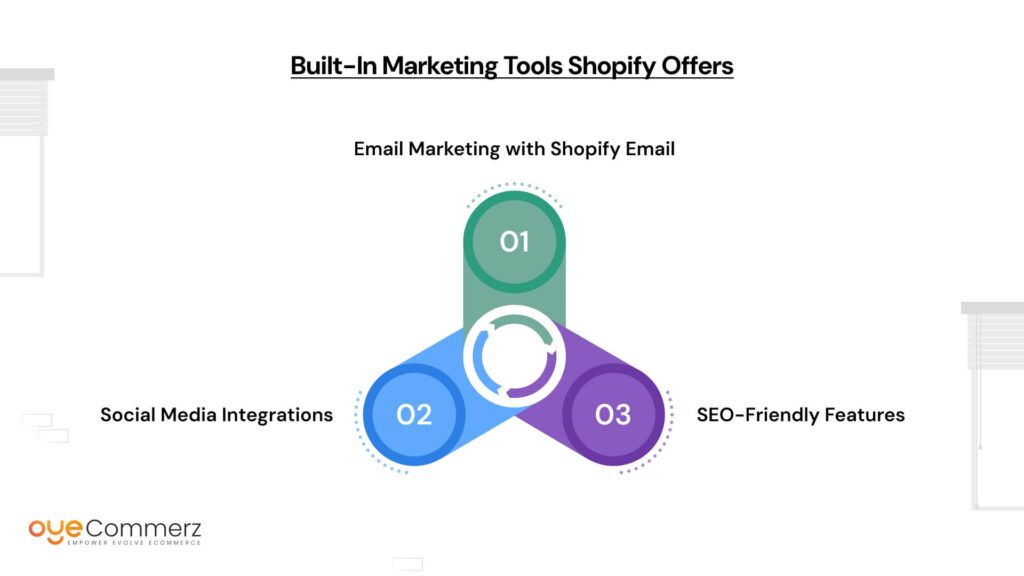
One of the biggest advantages of using Shopify lies in its built-in marketing features that support businesses at every stage. These tools are designed to simplify how brands connect with their audiences, promote their products, and boost sales. Let’s break them down:
a) Email Marketing with Shopify Email
Shopify makes email marketing straightforward and accessible right from the dashboard.
- Pre-Built Templates: Designed for different campaigns—promotions, announcements, product launches, these templates save time without compromising on style.
- Automation Tools: You can set up welcome emails, order confirmations, and abandoned cart reminders, helping you stay connected with customers without manual effort.
- Easy Customization: Use your brand logo, colors, and messaging for a professional, personalized look that builds recognition.
- Performance Analytics: Open rates, click-throughs, and conversions are all tracked so you can tweak your campaigns for better results.
These features eliminate the need for third-party email platforms for most small to mid-sized businesses.
b) Social Media Integrations
Social media is a powerful driver of sales, and Shopify makes the connection seamless.
- Sell on Facebook, Instagram, TikTok: List products directly on your social media storefronts to reach shoppers where they already spend time.
- Sync Products Automatically: Changes made on your Shopify store update across all platforms, saving hours of manual work.
- Automate Ad Campaigns: Use Shopify’s integrations to manage Facebook and TikTok ads, targeting the right users with minimal effort.
These tools help store owners reach a wider audience and create unified campaigns across multiple channels.
c) SEO-Friendly Features
Getting found online starts with a strong SEO foundation, something Shopify has prioritized.
- Custom URLs and Metadata: Tailor product page titles and descriptions to match user search intent.
- Clean Coding Structure: Helps search engines crawl your store efficiently.
- Image Optimization: Compresses images without quality loss, speeding up page load times.
- Mobile Responsiveness: All themes are mobile-optimized, vital for both users and search rankings.
Together, these tools show that Shopify isn’t just about selling, it’s about smart marketing built right in.
Shopify App Store: Expanding Marketing Potential
Beyond its built-in features, Shopify’s App Store offers thousands of tools that extend the platform’s marketing capabilities even further. As of 2024, the Shopify App Store features over 12,000 apps, covering every imaginable function, from email marketing to upselling and SEO.
These apps give businesses the flexibility to tailor their marketing approach, whether you’re just starting out or managing a high-volume store.
- SEO Tools: Apps like Plug in SEO help identify technical issues and offer improvement suggestions to boost organic rankings.
- Email & SMS Marketing: Platforms such as Klaviyo, Privy, and Omnisend bring advanced targeting, automation, and segmentation features.
- Push Notifications: PushOwl enables instant engagement through browser-based notifications, perfect for flash sales or reminders.
- Upsell & Cross-Sell: Apps like Bold Upsell let you recommend additional items at checkout, increasing average order value.
- Review Collection: Tools like Loox and Yotpo help gather and showcase customer feedback to build trust and credibility.
These apps are often praised by store owners and marketing professionals alike for their ability to solve specific challenges without coding or complex setups.
One of the standout benefits of using apps is scalability. You can start with free versions and upgrade as your business grows. Some merchants also work with Shopify marketing experts to identify the right app mix for their niche and goals.
So, does Shopify help with marketing? Absolutely, but what really unlocks its full power is how easily it integrates with tools designed to elevate every part of your strategy. Whether it’s SEO optimization, retargeting, or personalized messaging, Shopify’s app ecosystem turns your store into a fully functioning marketing machine.
In the end, it’s about choice and control. You decide how far you want to go, and Shopify provides the path.
Analytics & Data-Driven Insights
Marketing without data is like sailing without a compass. Shopify makes sure you never lose direction with its built-in analytics tools that give clear and actionable insights.
Here’s what you can track easily:
- Overview of your store’s performance: Sales, orders, top products, repeat customer rate—all in one place.
- Traffic sources: Know exactly where your visitors are coming from—Google, social media, direct links, or referrals.
- Customer behavior: See what people are clicking, how long they stay, and where they drop off.
This helps you make smart decisions about what’s working and what needs improvement.
Other key features include:
- Conversion tracking: Measure how your campaigns, pages, and products are performing.
- Sales attribution: Understand which channel or campaign contributed to a sale.
- A/B testing: While Shopify doesn’t offer it natively, many Shopify marketing apps let you split test headlines, product pages, or offers.
The dashboard is user-friendly, meaning you don’t need to be a data expert to make sense of it. Whether you’re running ads, email campaigns, or organic strategies, Shopify helps you stay on top of performance.
If you’re working with Shopify marketing experts, these insights can guide them to optimize your efforts even further. And if you’re doing it solo? You’ve still got the tools to make data-backed decisions confidently.
Shopify and Paid Advertising
Paid ads can be a powerful growth engine when done right. Shopify makes managing them simpler and smarter.
Here’s how:
- Direct integration with Google Ads, Facebook Ads, and Pinterest Ads
- One-click pixel installation: No coding needed to start tracking ad performance
- Smart audience targeting: Automatically create lookalike audiences based on customer data
- Dynamic retargeting: Show your visitors the exact products they viewed but didn’t purchase
This setup allows you to run ads more efficiently and reach people who are more likely to buy.
You can:
- Launch campaigns right from your Shopify dashboard
- See which products are converting and which ads need tweaking
- Sync your store with Facebook and Instagram Shops for smoother selling
Even if you’re new to ads, Shopify simplifies the process. And if you’re working with professionals or Shopify marketing services, they’ll have a solid foundation to build effective campaigns on.
Content Marketing with Shopify
Content marketing builds trust, drives traffic, and tells your brand’s story. Shopify helps you do it all from one platform.
Key features:
- Built-in blogging tool: No need for a separate platform. Publish directly from your dashboard.
- Clean formatting and easy editing: No tech skills required.
- SEO support: Add meta titles, descriptions, and alt tags easily.
Why does this matter?
- Blogs help educate your customers and improve search rankings.
- You can blend content with commerce—for example, write a style guide and link your products inside it.
- Regular posts show Google that your site is active, which helps with SEO.
Tips to get the most out of Shopify’s content tools:
- Post regularly (even 1–2 blogs a month helps)
- Focus on helpful, searchable topics (e.g., “How to choose the right skincare product”)
- Link to relevant products within your posts
- Share your blogs through email and social media to reach more people
If you’re using Shopify marketing experts or services, content strategy is often part of the package. But if you’re doing it solo, Shopify still gives you everything you need to start blogging and boosting organic reach.
Automation and Workflows: Save Time, Do More
Automation is one of Shopify’s quiet superpowers. It takes repetitive tasks off your plate so you can focus on growing your store.
What you can automate:
- Follow-up emails for new customers
- Abandoned cart recovery
- Inventory-based promotions (like sending alerts when an item is back in stock)
If you’re using Shopify Plus, you get access to Shopify Flow, which lets you create custom workflows without any coding.
Example automation flows:
- Tag high-spending customers for loyalty rewards
- Trigger marketing emails when stock levels change
- Auto-publish product reviews or feedback
For non-Plus users, many apps in the Shopify ecosystem offer similar automation features.
Benefits of automation:
- Saves time on routine tasks
- Delivers consistent communication to customers
- Increases efficiency as your store grows
Even if you’re just starting out, small automations, like a welcome email or cart reminder—can make a big impact. And for larger businesses, automation can be the backbone of a scalable marketing strategy.
Whether you’re using DIY tools or working with Shopify marketing experts, automating the basics lets you do more with less effort.
Working with Shopify Marketing Experts
While Shopify offers plenty of tools for DIY marketing, sometimes, getting expert help makes all the difference. Shopify marketing experts bring experience, strategy, and execution all in one place, helping you scale smarter and faster.
Here’s why working with experts can benefit your business:
- Tailored marketing strategies: Experts understand your niche, audience, and goals.
- Time-saving execution: From setting up ads to automating emails, they do the heavy lifting.
- Better use of tools: Experts know how to unlock the full potential of Shopify’s marketing features.
- Continuous optimization: They track results, tweak strategies, and keep improving campaigns.
You don’t need to feel overwhelmed by SEO, email marketing, paid ads, or content planning. Partnering with the right team can bring focus and results without trial-and-error headaches.
Whether you’re just starting or ready to grow aggressively, Shopify marketing services offered by professionals can be a game-changer.
Is Shopify Good for Marketing?
In short—yes, Shopify is one of the best platforms out there when it comes to combining eCommerce with smart marketing.
Here’s a simple breakdown:
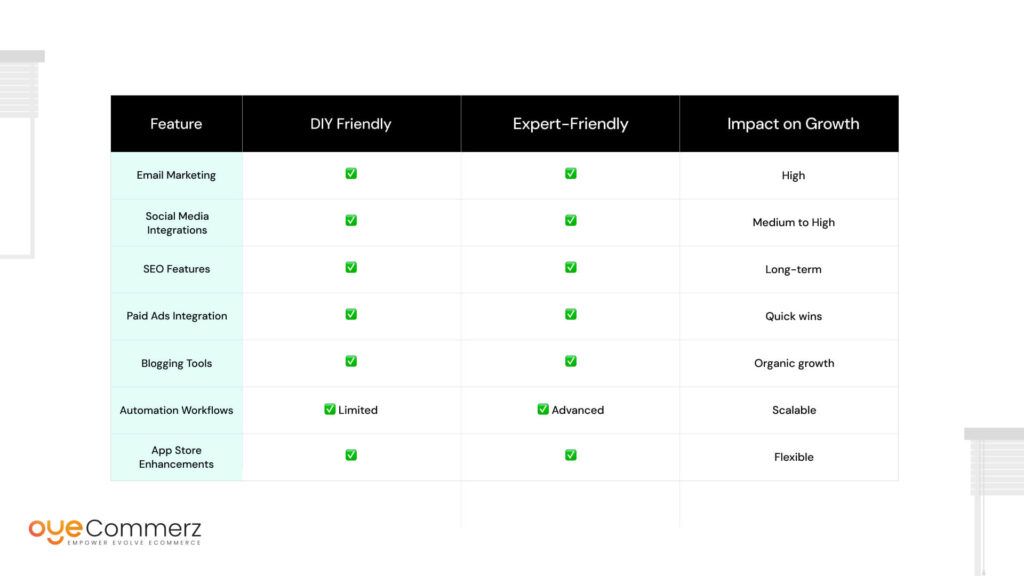
With its user-friendly design, flexible apps, and powerful built-in tools, Shopify doesn’t just help you sell, it helps you market smarter.
And if you ever feel stuck, there’s always the option to call in professionals to take things to the next level.
The tools are there. The support is there. Now it’s up to you, how far do you want your brand to go?
How Shopify Helps You Scale Marketing Over Time
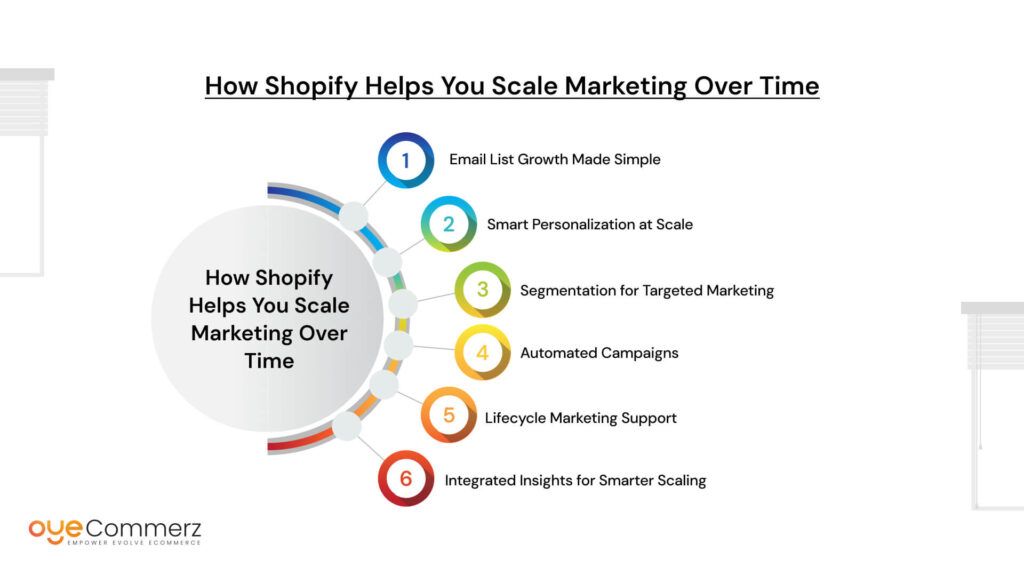
As your business grows, so should your marketing strategy. Shopify is built to evolve with you, offering tools that not only support your current goals but also prepare you for long-term success. Here’s how Shopify helps scale your marketing over time:
- Email List Growth Made Simple
Shopify lets you collect and manage customer emails effortlessly through popups, checkout opt-ins, and integrations with powerful tools like Klaviyo and Omnisend. - Smart Personalization at Scale
Use customer data to personalize product recommendations, offers, and emails—making every message feel relevant and timely. - Segmentation for Targeted Marketing
Shopify helps you segment your audience based on behavior, location, purchase history, and more. This means better targeting, higher conversions, and less wasted effort. - Automated Campaigns
Set up automated flows for welcome emails, abandoned carts, and post-purchase follow-ups. These workflows save time and keep your brand top-of-mind without constant manual input. - Lifecycle Marketing Support
From first-time buyers to repeat customers, Shopify gives you tools to engage users at every stage of their journey—building loyalty and lifetime value. - Integrated Insights for Smarter Scaling
As you grow, detailed analytics and reporting become even more essential. Shopify provides clear insights into which campaigns are driving revenue and where to optimize next.
Shopify makes scaling your marketing less about working harder—and more about working smarter, with tools built for long-term growth.
Ready to Maximize Your Shopify Marketing?
Let Oyecommerz take your store to the next level.
We’re not just Shopify experts, we’re growth partners. From smart ads to automated workflows, we bring everything under one roof.
Let’s make your Shopify store work smarter, not harder.
Contact us today and let’s build your success story together.
Ready to Integrate with Shopify?
Let Us Help You
Conclusion
Shopify goes far beyond being a simple online store builder, it’s a full-fledged marketing companion built to grow with your business. From automated emails and SEO-friendly features to seamless social media integration and powerful data insights, Shopify brings everything together in one intuitive platform.
What makes it truly stand out is how it simplifies complex marketing tasks, yet offers the flexibility to scale when you’re ready to go bigger. Whether you’re managing campaigns solo or working with Shopify marketing experts, the platform supports every step of the journey.
If you’re serious about growth, now’s the time to explore Shopify’s tools hands-on. Test the features, try the apps, run the ads, see what works best for you.
In today’s competitive eCommerce world, Shopify isn’t just your backend, it’s your marketing wingman, helping you turn clicks into customers and strategy into success.
Frequently Asked Questions
Shopify makes marketing super manageable by offering built-in tools for email, SEO, social media, and paid ads—all in one place. It’s perfect for business owners who want to grow without juggling multiple platforms
The biggest win is how easy it is to use—whether you’re starting your first store or scaling up. You get a powerful platform with design, payments, and marketing features, minus the tech headaches.
Shopify helps you reach more people by connecting your store with Facebook, Instagram, Google, and more. It also supports SEO and email campaigns to keep bringing customers back.
Yes, lots of them! From email automation and discount codes to SEO settings and ad integrations—Shopify packs in everything you need to promote your store effectively.
Because it keeps things simple without limiting your growth. It supports both beginners and big brands with a mix of user-friendly tools, flexibility, and a huge ecosystem of apps and experts.

